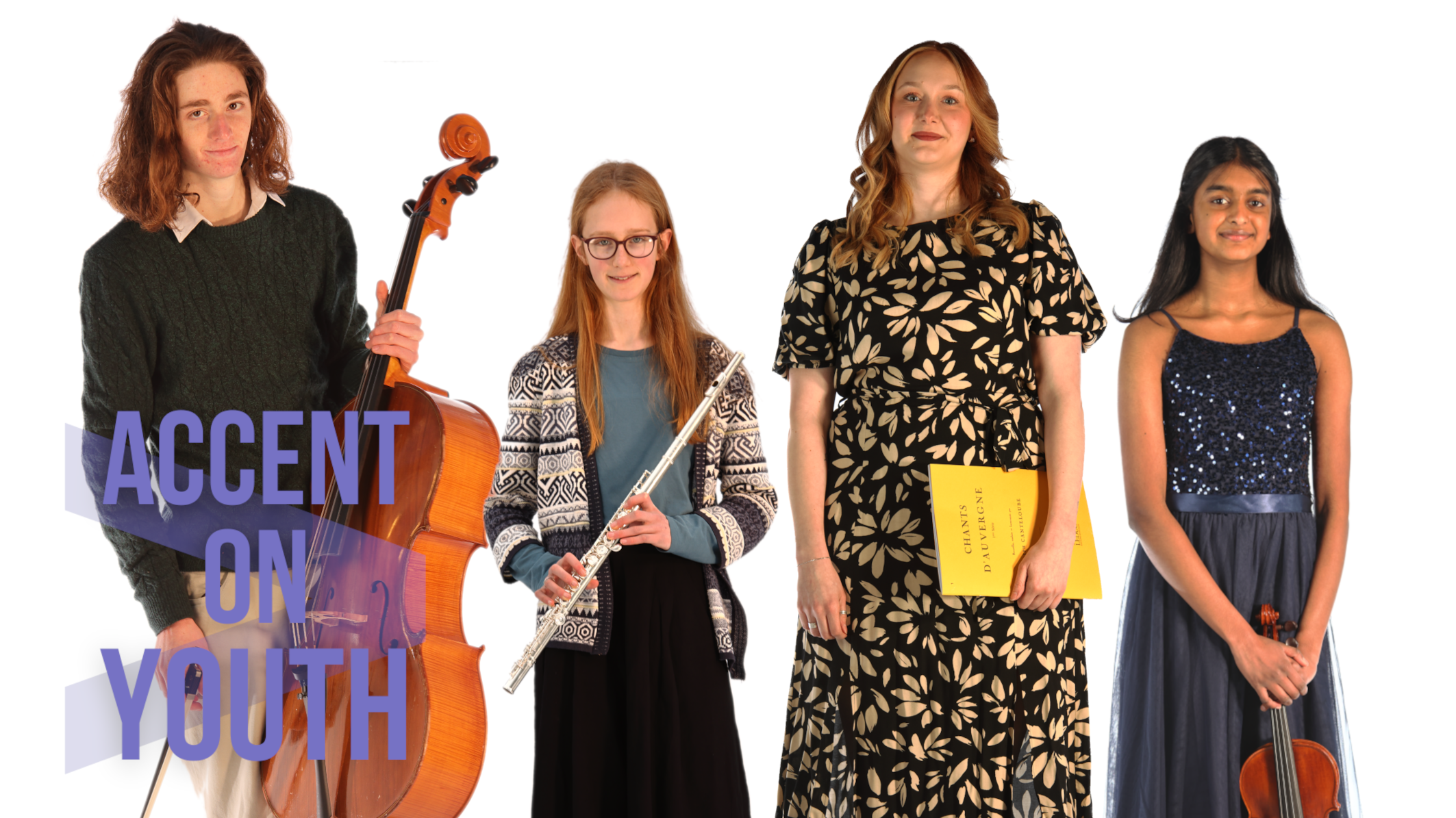Saturday, May 10th, 2025, 7:30 PMAccent on Youth 2025

Tickets: £12.00, students/under 18s £6.00
We are delighted to welcome not one but four young soloists for tonight's concert from the Sheffield Music Hub and the Sheffield Music Academy.
Emma Rae Ward will be singing from the “Chants d'Auvergne" ("Songs from the Auvergne"), a collection of folk songs from the Auvergne region of France arranged for soprano voice and orchestra by Joseph Canteloube between 1923-1930. The songs are in the local mediaeval language Auvergnat, a dialect of Occitan. The Auvergne region of France is a high plateau with extinct volcanoes and green, rolling hills stretching as far as the eye can see. Under summer skies, it is a land of skylarks, butterflies and lush carpets of wildflowers. This all comes across in the lilting strains of the folk song "Baïlèro" a shepherd's call. The music is stunningly beautiful — wait till you hear it — I discovered it on YouTube a while ago and can’t stop listening to it!!
Cellist Perris Heath is playing Fauré’s Élégie. Said to be one of the last works in which the composer allowed himself to express pathos so directly, this deeply emotional piece begins with a sad and somber theme, climaxes with an intense, tempestuous central section before returning to that elegiac opening theme. Originally composed for Cello and Piano, Fauré was asked for a version for cello and orchestra which was premiered in April 1901, with none other than Pablo Casals as a soloist and the composer as conductor.
Mabel Bailey will delight on her flute with a Ballade by Carl Reinecke. Reinecke was one of the most influential and versatile musicians of his time (the second half of the 19th century) which can easily be seen in the incredible list of his pupils which includes Edvard Grieg, Leoš Janáček, Isaac Albéniz, Johan Svendsen, Max Bruch, and many many others. Musically, think Robert Schumann (one of his teachers together with Mendelssohn and Liszt) and you’ll get the idea. The Ballade is charming and tuneful — Reinecke understood the instrument very well — he may not have set the world on its ear, but he was an expert musician.
Daniella Arnold joins us to share Massenet’s “Méditation”. The piece was originally composed as a symphonic intermezzo from the opera Thaïs and comes at the point when Athanaël, a Cenobite monk, has just confronted Thaïs, a beautiful and hedonistic courtesan and a devotée of Venus, and attempted to persuade her to leave her life of luxury and pleasure and find salvation through God. This piece is her meditating on this idea. Today it is considered to be one of the great encore pieces.
To learn more about any of our soloists, as well as conductor or leader, please click their name to the right of the image above.
In addition to this feast, the orchestra will be playing Bonis’s Bourrée and Mendelssohn’s first Symphony.
Mélanie Hélène "Mel" Bonis (21 January 1858 – 18 March 1937) was a prolific French late-Romantic composer. She wrote more than 300 pieces, including works for piano solo and four hands, organ pieces, chamber music, mélodies, choral music, a mass, and works for orchestra. The Bourrée that you’ll hear tonight is from a "suite in the ancient style” an idea that was much in vogue in 1904 the year of its composition. It’s a short piece with a mysteriously playful mood, beautifully and subtly orchestrated. In particular she imitates the sound of the ancient hurdy gurdy in the way she juxtaposes the oboe with the strings.
Mendelssohn’s composed his first symphony at the age of 15! The première was in London in 1829 and the review from “The Harmonicon” includes “... though only about one or two-and-twenty years of age, he has already produced several works of magnitude, which, if at all to be compared with the present, ought, without such additional claim, to rank him among the first composers of the age.... Fertility of invention and novelty of effect, are what first strike the hearers of M. Mendelssohn's symphony; but at the same time, the melodiousness of its subjects, the vigour with which these are supported, the gracefulness of the slow movement, the playfulness of some parts, and the energy of others, are all felt.... The author conducted it in person, and it was received with acclamations…."
The full programme for the evening is: –
Fauré: Élégie (Cello)
Bonis: Bourrée (Orchestra)
Massenet: Méditation from Thaïs (Violin)
Reinecke: Ballade (Flute)
Canteloube: Songs of the Auvergne (Soprano)
Mendelssohn: Symphony No. 1 (Orchestra)